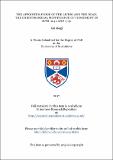Files in this item
The appointed judge of the living and the dead : the christological significance of judgment in Acts 10:42 and 17:31
Item metadata
| dc.contributor.advisor | Moffitt, David M. | |
| dc.contributor.advisor | Macaskill, Grant | |
| dc.contributor.author | Akagi, Kai | |
| dc.coverage.spatial | vii, 241 p. | en_US |
| dc.date.accessioned | 2019-09-27T06:55:35Z | |
| dc.date.available | 2019-09-27T06:55:35Z | |
| dc.date.issued | 2017-06-20 | |
| dc.identifier.uri | https://hdl.handle.net/10023/18569 | |
| dc.description.abstract | The speeches in Acts 10 and 17 include climactic statements about the role of Jesus in judgment. These statements raise the question of what Acts presents its protagonists to be saying about Jesus when they speak of him as a judge. The fields of research related to this question have not focused on these statements nor on the general christological significance of judgment. This study offers a reading of the speeches in Acts 10:34–43 and 17:22–31 in the context of Judaism from the late Second Temple period and shortly following that interprets them in light of their place within Luke-Acts as a narrative. Analysis of the activity and nature of eschatological judgment figures in selected pseudepigraphal and Qumran literature, as well as of the use of scripture to construct the figures in these texts, reveals similarities and differences in comparison to the presentation of Jesus in the Acts speeches. Like Jesus, these figures are unique eschatological judges who judge righteously. Several texts label such figures “messiah.” With the possible exception of Melchizedek, they are humans, although often with exceptional characteristics. In contrast to Jesus, most texts clearly distinguish their judgment from the final judgment of God at the time of the resurrection. Moreover, they neither forgive nor mediate forgiveness. Exegesis of Acts 10 and 17 demonstrates two points of the christological significance of judgment in those speeches. Specifically, it demonstrates that the statements about the role of Jesus as a judge both express messianic identity and suggest divine authority. The scope of Jesus’ judgment and the use of scriptural patterns in these speeches suggest his divine authority by associating him with the final judgment at the resurrection in a manner other texts only do of God. At the same time, his judgment identifies him as the appointed human messiah whom the speeches proclaim. | en_US |
| dc.language.iso | en | en_US |
| dc.publisher | University of St Andrews | |
| dc.subject | Acts | en_US |
| dc.subject | Christology | en_US |
| dc.subject | Judgment | en_US |
| dc.subject | Jesus | en_US |
| dc.subject | Luke-Acts | en_US |
| dc.subject | Messiah | en_US |
| dc.subject | Divine authority | en_US |
| dc.subject | Speech | en_US |
| dc.subject | Acts 10 | en_US |
| dc.subject | Acts 17 | en_US |
| dc.subject.lcc | BS2625.52A6 | |
| dc.subject.lcsh | Jesus Christ--Person and offices--Biblical teaching | en |
| dc.subject.lcsh | Bible. Acts--Criticism, interpretation, etc. | en |
| dc.subject.lcsh | Bible. Luke--Criticism, interpretation, etc. | en |
| dc.subject.lcsh | Judgment--Religious aspects--Christianity | en |
| dc.title | The appointed judge of the living and the dead : the christological significance of judgment in Acts 10:42 and 17:31 | en_US |
| dc.type | Thesis | en_US |
| dc.type.qualificationlevel | Doctoral | en_US |
| dc.type.qualificationname | PhD Doctor of Philosophy | en_US |
| dc.publisher.institution | The University of St Andrews | en_US |
This item appears in the following Collection(s)
Items in the St Andrews Research Repository are protected by copyright, with all rights reserved, unless otherwise indicated.

